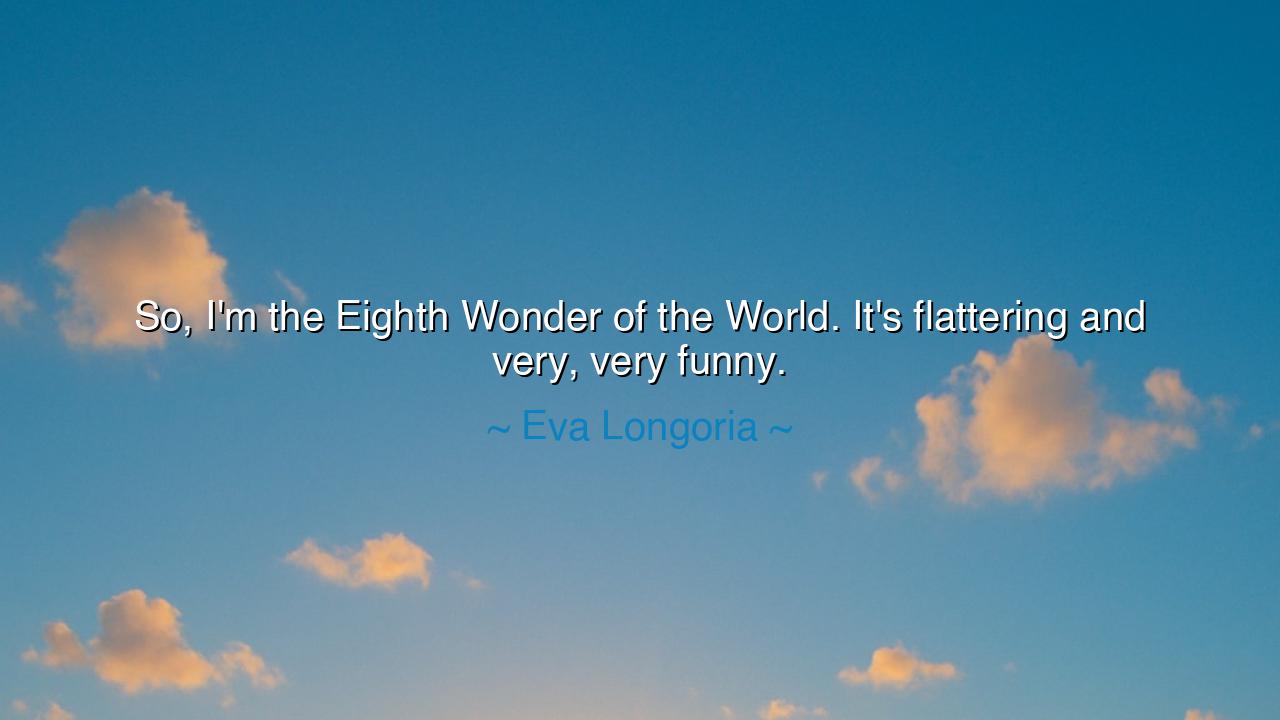
So, I'm the Eighth Wonder of the World. It's flattering and very






“So, I’m the Eighth Wonder of the World. It’s flattering and very, very funny.” — thus spoke Eva Longoria, the actress whose name became synonymous with beauty, grace, and self-assurance. On the surface, her words glimmer with humor, a playful acknowledgment of the praise that fame often brings. Yet beneath the laughter lies a truth both ancient and enduring — the dance between humility and glory, between how the world perceives us and how we perceive ourselves. To be called a “wonder of the world” is to be elevated, adored, almost mythologized. But to find that title funny — to laugh at it — is to show wisdom, the understanding that all praise is fleeting, and that true worth lies within, not upon the tongues of others.
When Longoria calls herself the Eighth Wonder of the World, she does not boast — she mirrors the irony of being placed upon a pedestal by the world’s imagination. The ancients too knew this phenomenon well. They built their Seven Wonders — the Pyramids of Giza, the Hanging Gardens of Babylon, the Statue of Zeus, and others — as symbols of perfection, mastery, and eternal splendor. Yet time devoured them all. Stones fell, marble cracked, and the desert reclaimed its monuments. Only one Wonder, the Great Pyramid, remains to remind us that even the greatest marvels of human hands can crumble. So when Longoria laughs at being named an “Eighth Wonder,” her laughter carries ancient wisdom — a recognition that beauty and fame, though dazzling, are as fragile as sand in the wind.
Her humor reveals not vanity, but balance. It is the laughter of one who knows both her worth and her impermanence. The ancients would have called this sophrosyne — the virtue of moderation, the harmony of pride and humility. For it is dangerous to believe too deeply in the praise of others, just as it is foolish to ignore one’s gifts. The wise learn to stand between the two — to accept admiration with grace, and yet remember the truth of their own humanity. Longoria’s words, “It’s flattering and very, very funny,” are a shield against arrogance. She accepts the compliment, but does not become its captive.
Consider the tale of Alexander the Great, who, after conquering nations, demanded to be called divine. His tutor, Aristotle, warned him that no mortal escapes decay. When a philosopher placed a skull before him and said, “This too was once a king,” Alexander wept. His greatness had made him forget that even the most admired are still mortal. Longoria’s laughter is the antidote to that forgetfulness. In the mirror of fame, she sees not a goddess, but a woman — a being capable of humor, humility, and perspective. Her mirth is a form of strength, proof that she rules her fame, and not the other way around.
Moreover, her quote celebrates the freedom of self-awareness. To call herself a “Wonder” while laughing at it is to declare mastery over her image. The ancients taught that the truly wise are those who can laugh at themselves, for such laughter springs from self-knowledge. The gods themselves, in the old myths, favored those who could see their own absurdity and remain unshaken. Longoria’s laughter disarms the vanity of adoration — she refuses to be trapped in the illusion of perfection. And in that freedom, she becomes, indeed, wondrous.
Her words also speak to the modern soul, which often confuses praise with purpose. In an age where many seek validation through the eyes of others, her gentle humor reminds us to take fame lightly. To be called a Wonder may feel glorious, but it is only meaningful if we remain rooted in truth. The ancients said, “Know thyself,” and in that knowing, one finds peace. Longoria’s amusement shows that she understands the great paradox: that laughter, born of humility, is the truest form of confidence.
So let this teaching be passed down: Accept praise with grace, but do not bow to it. Laugh at the crown before it blinds you. Be grateful when others call you remarkable, but remember that the real marvel lies in your character, not your acclaim. Build no monuments to your image, for time will take them all — but build instead a spirit that can laugh at itself, and you will outlast stone and fame alike. As Eva Longoria reminds us, to be called a wonder is an honor; to find it funny is wisdom. For in laughter, we remain human — and in humanity, we find the only glory that endures.






AAdministratorAdministrator
Welcome, honored guests. Please leave a comment, we will respond soon